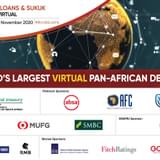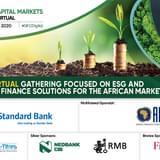“Elements of environmental, social and governance, or ESG, are becoming more prominent in South Africa – and to some extent across the rest of the continent. From an investment perspective, we had previously seen a greater push to hunt for these assets outside the country,” he says. “That is starting to change, which is important. The push needs to come from lenders and investors – from allocators of capital.”
Stewart was instrumental in developing and launching Nedbank’s pioneering oversubscribed green bond transaction, helping the company raise ZAR1.7bn and garnering more than ZAR5.5bn in demand from conventional and dedicated green investors.
Proceeds from the bond, which was certified by the Climate Bonds Initiative, were used to fund a slew of renewable energy projects, where the bank already has a commanding lead in the domestic market. Nedbank, which is currently working on its second green bond transaction, has more than ZAR40bn in exposure to the segment, making it one of the chief financiers of renewable energy in South Africa.
“The most challenging aspect of [the first green bond transaction] was ensuring we had the necessary foundation in place to select qualifiable projects, regularly monitor and report on the progress and impact of the underlying projects, and use of proceeds. The transaction itself and the frameworks we use are CBI-compliant, and conform to the ICMA Green Bond Principles, two gold standards when it comes to green bonds, and we partner with Carbon Trust on verification.”
The South African market is starting to become increasingly familiar with ESG-linked funding structures. The country’s first green bond was issued by the City of Johannesburg in 2014, which saw it raise ZAR1.5bn, with the proceeds of the deal going towards low-carbon transport and other green municipal projects
This was followed by the City of Cape Town in 2017, which sold ZAR1bn in green bonds to finance water and low-carbon transport projects, and Growthpoint Properties, which in March 2018 became the first company to issue a green bond on the Johannesburg Stock Exchange when it sold ZAR1.1bn in notes across three tranches (five, seven, and ten years), in addition to being the first corporate in sub-Saharan Africa to sell certified green securities.
The green bond sector is nascent but growing at a crucial time for South Africa and sub-Saharan Africa more broadly, where there remain significant environmental risks as well as huge potential and demand for new investment into sustainable infrastructure.
Between mid-2017 and September 2018, the Western Cape region experienced a severe drought – it relies almost exclusively on rainfall for fresh water, stored in six major dams in the region – and was forced to implement significant water restrictions to curb a severe water shortage, which acutely impacted the City of Cape Town.
According to IFC data, renewable energy projects, green buildings and smart water initiatives will require about USD89bn, UDS768bn and USD101bn in new investment by 2030. In 2018, the Government of South Africa, which is still heavily reliant on coal-fired power produced by state-run utility Eskom, pledged to generate up to 26% of its electricity from wind and solar by 2030.

Lack of Guidelines, Lack of Awareness Holds Sector Back
Some observers have argued that the green bond market is held back by a lack of clearly definable domestic guidelines that meet international standards, like the CBI qualification or ICMA’s Green Principles, particularly in relation to social impact objectives.
But this too is changing. Last year, ICMA published its Social Bonds Framework containing detailed guidelines around use of proceeds, transparency, disclosure and reporting to support the issuance of bonds designed to improve a wide range of social outcomes.
September this year also saw the launch of the Principles for Responsible Banking, with more than 130 banks from almost 50 countries signing up to the framework – representing USD47tn in assets, and providing important clarity on how financial products and services can generate targeted, measurable outcomes aligned with the UN’s Sustainable Development Goals.
“It is true that we have more clearly identifiable standards around inputs and outcomes related to the climate than to social imperatives, which is partly a reflection of where global institutions have placed their energies, and partly a reflection of the fact that there is a scientific basis underpinning those standards, as well as robust modelling,” Stewart admits.
“Whether through targeted fundraising or other activities, there is often a huge diversity in the range of social outcomes that institutions are striving for. We need to look at all the different outcomes we are striving for, and ensure integrity in terms of ESG effectiveness in the same way we would approach climate sustainability. The level of visibility and measurability and transparency required will ultimately be driven by investors and lenders.”
Nevertheless, Stewart says organisations which don’t invest enough in bringing more visibility onto their efforts around ESG, risk inflicting commercial damage on themselves in the long-term.
“Through the use of social media, people can mobilise on a scale and at a pace never really seen before, and inflict heavy corporate financial losses if they have reason to believe your company is part of the problem. Sustainability reporting can help insulate companies from some of those risks – because it will force them, and those who allocate capital to them, to question what is being done with that capital. It’s important from a commercial risk perspective because it can pre-empt some potential sustainability-linked issues, but it also harmonises with our more general duty to society.”
“At the end of the day, the intersection of those win-wins – things that are good for society and for business – is where the wider ESG-linked asset class will take off,” he concludes.










